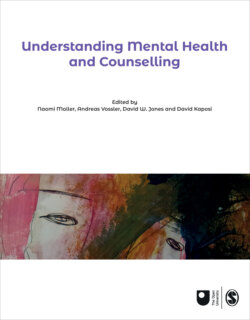Читать книгу Understanding Mental Health and Counselling - Группа авторов - Страница 39
На сайте Литреса книга снята с продажи.
3 Person-centred and humanistic approaches
ОглавлениеThe person-centred tradition, sometimes also referred to as the ‘humanistic’ tradition as it drew from humanistic psychology, emerged predominantly in the 1940s and became one of the most popular alternatives to psychoanalytic and psychodynamic psychotherapies in the twentieth century. It was built on the philosophical principles of optimism about human nature and potential; non-directive and non-authoritarian approaches to the therapeutic encounter; and hope that emotional insight would reduce conflict at both an interpersonal and international level (relevant in the wake of the Second World War and to the anxieties of the cold war). Like most traditions in psychotherapy, the person-centred approach is strongly associated with a founding father – Carl Rogers is at the centre of most of the historical literature, which is still predominantly written by practitioners from within the field (such as Kirschenbaum, 1979; Kirschenbaum and Henderson, 1989; Rogers, 1967).
Humanistic psychology An approach to psychology and psychotherapy that focuses on individual uniqueness, human agency, and personal growth and fulfilment. It challenges the deterministic aspects of behaviourism and psychoanalysis.
Rogers drew from an eclectic range of influences. Historian Christopher Harding has pointed out that he spent time training for Christian ministry (Harding, 2018). Immediately after his BA in History from the University of Wisconsin in 1924, Rogers began at the Union Theological Seminary in New York, and spent time as a visiting pastor in Vermont in 1925. He quickly became disillusioned with the seminary’s teaching and this crisis of faith led to his conversion to clinical psychology, which he formally began to study at Columbia University in the same year (Jones-Smith, 2016). Nevertheless, Rogers maintained an interest in Christian thought and, in 1965, he put himself in public dialogue with the theologian Paul Tillich. To Rogers, the most important emotional resources available to a person came from the human rather than the divine. Nevertheless, such dialogues showed a willingness to engage with spiritual ideas, as well as the resonances and parallels that person-centred counselling had with Christian thought and pastoral practice (Harding, 2018).
Clinical psychology A professional specialism in psychology. It is an ‘applied’ branch of psychology in that clinical psychologists work directly with clients, offering therapy but also performing many other roles in mental health services.
Rogers’ own person-centred philosophy later in life had secular origins, drawing heavily from thought in biology and the sciences. The son of a farmer, Rogers had spent his childhood poring over agricultural science books, learning about control trials for crops and the underlying biological principles of plant and livestock management. By his own reckoning, this early self-schooling was highly influential on his later career (Rogers, 1967). The curative power of psychotherapy, for Rogers, lay in its capacity to help an individual gain insight into their authentic self, and to remove obstacles to achieving their potential through self-actualisation. This type of language was especially resonant in the mid-twentieth century owing to the popularity of existentialist thinkers. However, Rogers appears to have encountered ideas about personal growth and potential through reflection on biological thought, including the work of the Nobel Prize-winning Hungarian biochemist Albert Szent-Györgyi, who argued that the universe, and all organic life, had a tendency towards increased order, growth and development (Szent-Györgyi, 1957). For Rogers, this creative drive forward was a fundamental part of human nature, and it was this force that needed to be facilitated in the therapeutic encounter (Raskin, 1996).
Self-actualisation A concept associated with humanistic psychology by which an individual is enabled to fulfil their potential and meaning in life, and to realise their personal talents.
